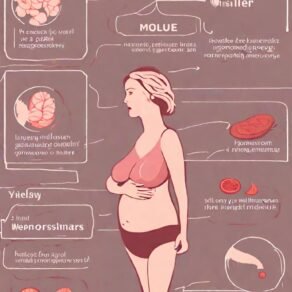Title: Navigating Menopause Weight Gain: Understanding the Causes and Management
Introduction:
Menopause is a natural transition in a woman’s life that typically occurs in her late 40s to early 50s. Along with hormonal changes, many women experience weight gain during this phase. Understanding the factors contributing to Climacteric-related weight gain and implementing effective management strategies are crucial for maintaining overall health and well-being. In this article, we delve into the causes of menopause weight gain and provide practical tips for managing it effectively.
Understanding Menopause Weight Gain:
Menopause-related weight gain is often attributed to hormonal changes, particularly a decline in estrogen levels. This hormonal shift can affect metabolism, leading to changes in body composition, including increased abdominal fat. Additionally, aging and lifestyle factors such as reduced physical activity, poor dietary habits, and stress can also contribute to weight gain during Climacteric.
Factors Contributing to Menopause Weight Gain:
- Hormonal Changes: Estrogen plays a role in regulating metabolism and fat distribution in the body. As estrogen levels decline during Climacteric, women may experience changes in appetite, metabolism, and fat storage, contributing to weight gain, particularly around the abdomen.
- Reduced Muscle Mass: Aging is associated with a natural decline in muscle mass, which can lead to a decrease in basal metabolic rate (BMR). This reduction in muscle mass makes it easier to gain weight and harder to maintain or lose weight during menopause.
- Lifestyle Factors: Sedentary behavior, poor dietary habits, and stress can all contribute to weight gain during Climacteric. Lack of physical activity decreases calorie expenditure, while unhealthy eating habits can lead to excess calorie consumption. Additionally, stress can trigger emotional eating and disrupt hormone levels, further exacerbating weight gain.
Managing Menopause Weight Gain:
- Regular Exercise: Incorporating regular physical activity into your routine is essential for managing Menopause-related weight gain. Aim for a combination of cardiovascular exercise, strength training, and flexibility exercises to improve metabolism, build muscle, and maintain overall health.
- Healthy Eating Habits: Focus on a balanced diet rich in fruits, vegetables, lean proteins, and whole grains while limiting processed foods, sugary snacks, and high-fat foods. Pay attention to portion sizes and practice mindful eating to avoid overeating.
- Stress Management: Find healthy ways to cope with stress, such as practicing relaxation techniques, meditation, yoga, or spending time in nature. Managing stress can help prevent emotional eating and promote overall well-being.
- Hormone Therapy: In some cases, hormone therapy may be recommended to alleviate menopausal symptoms, including weight gain. However, it’s essential to discuss the potential risks and benefits with your healthcare provider before considering hormone therapy.
Conclusion:
Climacteric-related weight gain is a common concern for many women transitioning through this phase of life. By understanding the factors contributing to weight gain, such as hormonal changes, reduced muscle mass, and lifestyle factors, women can take proactive steps to manage their weight effectively. Through regular exercise, healthy eating habits, stress management, and, if necessary, hormone therapy, women can maintain their overall health and well-being during the menopausal transition. With the right strategies and support, women can embrace this new chapter of life with confidence and vitality.





